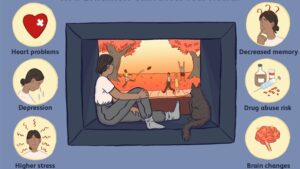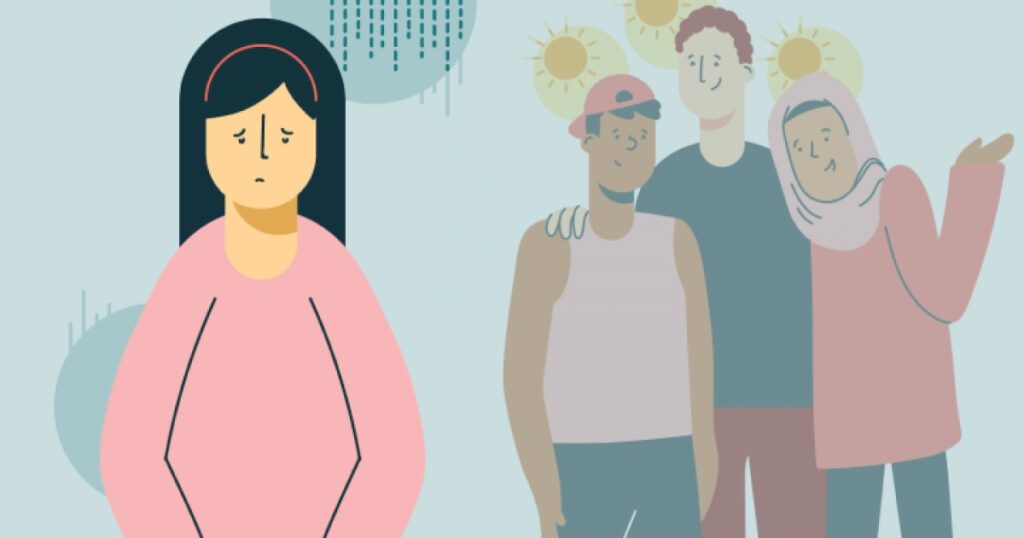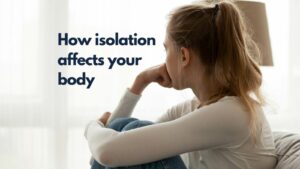Depression is a mental illness that affects millions of people all over the world. While there are many different types of depression, one of the most dangerous is isolation depression. This type of depression can occur when a person becomes isolated from friends, family, and social activities. In this blog post, we will discuss the signs and symptoms of isolation depression, as well as how to get help if you or someone you know is suffering from it.
Contents
What Does Isolation Depression Mean?

Isolation depression is described as a feeling of sadness, loneliness, or despair that occurs when a person becomes isolated from others. It is a feeling of being cut off from the world and can be accompanied by physical symptoms such as fatigue, weight loss or gain, insomnia, and headaches.
People with isolation depression may also have difficulty concentrating or making decisions. It is believed that this type of depression is more common in introverts, although anyone can be affected by it. The important thing to remember is that isolation depression is a real medical condition that should not be ignored.
Therefore, if you or someone you know is experiencing the symptoms of isolation depression, it is important to seek help from a mental health professional. With proper treatment, isolation depression can be effectively managed.
What Are The Signs And Symptoms?
Several signs and symptoms may be indicative of isolation depression. These include:
- Feeling hopeless or helpless
- Losing interest in activities that used to bring joy
- Withdrawing from friends and family
- Sleeping too much or having trouble sleeping
- Experiencing changes in appetite
- Feeling fatigued or low energy
- Having difficulty concentrating
- Feeling worthless or guilty
Common negative thoughts associated with depression may be expressed as, “It’s all my fault,” or “What’s the point?” You may also feel worthless, self-hate, or have disproportionate guilt.
Depression affects millions of individuals every year, but there are solutions available for it, ranging from minor adjustments to pharmaceuticals. The first step toward regaining your normal feelings is to seek expert assistance, regardless of the route you choose to take.
Is Isolation A Form Of Depression?
Sometimes isolation is considered a form of depression. It can be difficult to spot because its symptoms are not always obvious. But isolation can have a significant impact on your mental health. Most of the time, people who suffer from isolation depression withdraw from social activities and contact with others.
According to studies, depression is the leading cause of disability worldwide. And isolation can make depression worse. If you’re feeling isolated, it’s important to reach out for help. There are many resources available to help you cope with isolation and depression.
Although isolation might seem like a healthy habit, it’s an unhealthy response to depression that your loved one may fall into while hiding out at home. For example, substance use is common with depression and can be dangerous. It also worsens depressed moods. If you need help, know that treatments are available and that you’re not alone in this fight against depression.
“Negative emotions like sadness and anger can boost your creativity. So if you’re feeling down, channel that emotion into something productive and creative. It might just help you feel better.”
What Causes People To Feel Isolated In Depression?
People feel isolated in depression because of the following causes:
- Low self-esteem: People who have low self-esteem or low confidence they generally prone to depression and social anxiety. This leads to them feeling like they are not good enough and that they don’t belong which in turn causes them to feel isolated.
- Pessimism: Pessimistic People tend to see the negative in all situations. This outlook on life can make it hard for them to socialize and connect with others. They may start to believe that nobody could possibly understand them which leads to isolation and depression.
- Loss: The loss of a loved one, a job, or even a pet can lead to feelings of isolation and loneliness. This is because the person feels like they have lost their support system and they are now all alone.
- Highly sensitive people: People who care a great deal and are highly sensitive to their situation are more likely to develop depression. This is because they tend to overthink and focus on the negative which leads to isolation.
- History of trauma or abuse: Individual who has a history of abuse are much more likely to develop depression. The reason being is that they often feel like nobody can understand what they have been through which leads to feeling isolated.
- Social anxiety disorder: An individual who suffers from social anxiety disorder will often feel very anxious in social situations. This leads to them avoiding social situations which can cause isolation and depression. This can make it hard to maintain relationships and can cause people to withdraw from social activities.
- Introvert: Introverted people are prone to anxiety and depression. This is because they often feel like they don’t fit in or that they are not good enough. Their introverted nature can lead to them feeling isolated. Introverts may also feel isolated in depression because they prefer to spend time alone. But this doesn’t mean that they don’t want friends or close relationships. It can just be harder for them to connect with others.
If you can relate to any of these causes, you may be more likely to experience depression. But it’s important to remember that everyone experiences depression differently, and there is no one “right” way.
How Does Social Isolation Affect The Individual?
Social Isolation can involve emotional isolation, physical isolation, or both. Emotional isolation is when someone feels cut off from other people, even if they are physically close to them. Physical isolation is when someone is physically separated from others, such as being in solitary confinement.
Both emotional and physical isolation can hurt mental health. Emotional isolation can lead to feelings of loneliness, anxiety, and depression. Physical isolation can lead to physical health problems, such as high blood pressure and a weakened immune system. It is even linked to an increased risk of several diseases. These include:
- Heart disease
- Stroke
- Alzheimer’s disease
- Dementia
- Cancer
People who are isolated also have a higher risk of suicide. This is because they often feel like they have no one to turn to and that they are all alone in the world. It can lead to unhealthy lifestyle choices such as increased alcohol consumption, smoking, and poor diet. All of these choices contribute to an overall decline in health.
How Can You Manage Isolation Depression?
 We can manage isolation depression by following these steps:
We can manage isolation depression by following these steps:
Spend more time with your family
It is important to spend more time with your family to cope with isolation and depression. It is important to talk to your family members about your feelings and let them know how they can help you. Make sure to get out of the house every day. Getting out of the house with your family is important for managing isolation depression. This will help you to cope with isolation and depression.
Pursue physical outdoor activity
It is important to maintain an active lifestyle and necessary to do physical activity every day. It is necessary to eat nutritious and healthy food daily. To maintain good physical and mental health it is important to do any fun activity like yoga, or any sports activity. One can feel better when one is in the sun, and one can see others.
Pursue new hobbies and interests
Cultivate new interests and activities. It is important to have new hobbies and activities to do to cope with isolation and depression. It is necessary to find an activity that you enjoy doing. Also, it is necessary to meet new people. When you have a new hobby or interest, it will help you to cope with isolation and depression.
Practice meditation
It is important to do breathing exercises daily to maintain mental health. It is necessary to focus on your breath and to be in the present moment. To do this, it is important to find a comfortable place to sit or lie down. Then, you close your eyes and focus on your breath. You inhale through your nose and exhale through your mouth. You can do this for as long as you like. It will help in treating depression, anxiety, and stress.
These are some tips that can help you structure your day and get more out of life by filling it with activities. People suffering from isolation or depression should involve themselves in daily activities to help improve their mood.
When To Seek Professional Help?
Professional help is essential in some cases to manage isolation depression. For example:
- When feeling down, hopeless, or helpless for more than two weeks
- Trouble sleeping or eating
- Self-harming
- Thinking about suicide
In these cases, it is necessary to seek professional help from a mental health expert. These professionals can help you manage isolation and depression. There are many ways to get help for isolation depression. You can contact a mental health professional, such as a therapist, counselor, or psychologist. You can also join a support group for people with depression.
Therefore, you should not ignore the signs of isolation and depression. These can lead to serious health problems. If you think you might be suffering from isolation or depression, seek professional help. Remember, you are not alone. With proper treatment, you can manage these conditions and live a healthy and happy life.
Conclusion
It is concluded that isolation and depression have a direct link to each other. It is necessary to understand the symptoms of both conditions. Isolation can lead to depression, and depression can lead to isolation. These are two dangerous conditions that can hurt our health. You should take measures to prevent these conditions from happening or worsening.
Thus, if you think you might be suffering from isolation depression, seek professional help today. With proper treatment, you can manage these conditions and live a healthy and happy life! You can also reach out to Therapy Mantra for more information and guidance. And schedule an online therapy session or you can download our free Android or iOS app.



